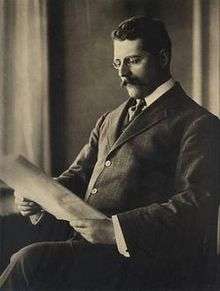Max Muspratt
| Max Muspratt | |
|---|---|
 Max Muspratt in 1917 | |
| Born |
3 February 1872 Seaforth Hall, Liverpool, England |
| Died |
20 April 1934 (aged 62)[1] Fulwood Park, Liverpool |
| Occupation | chemist, businessman, politician |
Sir Max Muspratt, 1st Baronet (3 February 1872 – 20 April 1934) was a British chemist and a politician in the city of Liverpool, England.
Early life and education
He was born at Seaforth Hall, Seaforth, Lancashire, the son of Edmund Knowles Muspratt and his wife Frances. He was one of eight children and a brother of Suffragists Nessie Stewart-Brown and Julia Solly.[2] He was an uncle of Nelia Penman, who served as President of the Women's Liberal Federation.[3] The Muspratt family were originally from Dublin but moved to Liverpool in 1822 when James Muspratt, the father of Edmund, established a chemical factory in Vauxhall Road.[4]
Muspratt was educated at a private school in Hemel Hempstead and at Clifton College before studying industrial chemistry at Zürich Polytechnic.
United Alkali
Muspratt joined the United Alkali Company in 1892 (the firm had been founded by his father), becoming a director in 1901 and its chairman from 1914.[5] In 1926 the United Alkali Company merged with three other companies to form Imperial Chemical Industries (ICI) and Muspratt was a director from its founding until his death in 1934. He was also a director of the International Automatic Telephone Company. He was a member of the Society of Chemical Industry from 1894, becoming its Vice–President from 1904 to 1906 and again from 1921 to 1924. From 1924 he was chairman of the Association of British Chemical Manufacturers and from 1926–1927 president of the Federation of British Industries.[6]
Political career
Muspratt was a Liberal and served on the Liverpool City Council from 1904. At the January 1910 general election he was returned to the House of Commons as Member of Parliament (MP) for Liverpool Exchange, but was not re-elected at the December 1910 general election,[7] and was defeated in the Bootle by-election, 1911. He left the Liberals for the Conservative Party in 1926.[8]
During the First World War, Muspratt served as Lord Mayor of Liverpool from 1916 to 1917.[9] He advised the Ministry of Munitions about industrial chemical matters, particularly in the supply of sulphuric acid.[4] and worked in the Trench Warfare Department.[5]
Personal life
In 1896, Muspratt married Helena Agnes Dalrymple Ainsworth of Blackburn, Lancashire. They had two sons, one of whom died in childhood, and two daughters. His surviving son, Rudolph, pre–deceased him in 1929.[4] Rudolph had fathered two twin boys who died in infancy.[1]
He was created a baronet in 1922, of Merseyside, Lancashire, in the 1922 Dissolution Honours.[5][10]
He died on 20 April 1934, the day after undergoing an operation for "internal trouble." The baronetcy became extinct on his death.[1]
Notes
- 1 2 3 "Obituary: Sir Max Muspratt". The Times. The Times Digital Archive. 21 April 1934. p. 12.
- ↑ Krista Cowman, ‘Brown, Nessie Stewart (1864–1958)’, Oxford Dictionary of National Biography, Oxford University Press, 2004 accessed 11 Feb 2014
- ↑ Nottingham Evening Post, 9 Apr 1937
- 1 2 3 Trevor I. Williams, (2004) ‘Muspratt, James (1793–1886)’, Oxford Dictionary of National Biography, Oxford University Press, Retrieved on 9 March 2007.
- 1 2 3 The London Gazette: (Supplement) no. 32766. p. 8016. 10 November 1922. Retrieved 2007-12-20.
- ↑ Biographical Database of the British Chemical Community, 1880–1970: Muspratt, Max, Sir, The Open University, retrieved 2007-07-04
- ↑ Rayment, Leigh (2003), The House of Commons Constituencies beginning with "E", retrieved 2007-07-04
- ↑ E. Chambré Hardman Archive: Sir Max Muspratt (1872–1934), National Trust, retrieved 2007-07-04
- ↑ Former Mayors and Lord Mayors of the City of Liverpool, The City of Liverpool, retrieved 2007-07-04
- ↑ The London Gazette: no. 32779. p. 9029. 22 December 1922. Retrieved 2007-12-20.
External links
- Hansard 1803–2005: contributions in Parliament by Sir Max Muspratt
| Parliament of the United Kingdom | ||
|---|---|---|
| Preceded by Richard Cherry |
Member of Parliament for Liverpool Exchange January 1910–December 1910 |
Succeeded by Leslie Scott |
| Baronetage of the United Kingdom | ||
| New creation | Baronet (of Merseyside, Lancashire) 1922–1934 |
Extinct |